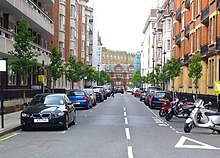Hallam Street

Tree lined Hallam Street
|
|
| Former name(s) | Charlotte Street Duke Street |
|---|---|
| Length | 0.3 mi (0.5 km) |
| Postal code | W1W |
| Coordinates | 51°31′17″N 0°08′38″W / 51.5213°N 0.1439°W |
| south end |
Broadcasting House Langham Street |
| north end | no junction |
Hallam Street is a road situated in the Parish of St Marylebone and London’s West End. In administrative terms it lies within the City of Westminster's Marylebone High Street Ward as well as the Harley Street Conservation Area. Formerly named both Charlotte Street and Duke Street, it was renamed in the early 1900s after Henry Hallam (1777–1859), a noted historian who had been a local resident, and his son Arthur Henry Hallam (1811–1833), poet and the subject of Tennyson's elegy In Memoriam.
Hallam Street is situated within the boundaries of the ancient Manor of St Marylebone. The history of the Manor can be traced back to the Domesday Book in the 11th century, when the area was divided into two manors: Lilestone and Tyburn. Much of the area was covered with forest and marshland and formed part of the great forest of Middlesex.
Like the better known Portland Place and Great Portland Street, Hallam Street was originally developed by the Dukes of Portland, who owned most of the eastern half of Marylebone in the 18th and 19th centuries. Richard Horwood’s 1790s map of London shows that Charlotte Street had by then been laid out exactly as Hallam Street is today. Maps from that period show houses lining the entire length of the street by that time. In the late 19th/early 20th century, following the expiration of individual buildings’ 99-year leases, Hallam Street was redeveloped and many of its original Georgian houses were replaced by larger mansion and office blocks.
The street has buildings of mainly five to eight storeys with a strong residential presence. Notable residents who lived for a time in the street include the Pre-Raphaelite artist and poet Dante Gabriel Rossetti (1828–1882), the painters John Sell Cotman (1782-1842), Cornelius Varley (1781-1873), Sir Peter Francis Bourgeois(1753–1811), dominatrix Theresa Berkley (d.1836), the writer William Gerhardi (1895–1977), the conductor and founder of The Proms Sir Henry Joseph Wood (1869–1944), American journalist and broadcaster Edward R Murrow (1908–1965), World War Two hero Wing Commander Forest Frederick Edward Yeo-Thomas (1901–1964), the radio and television writer Ernest Dudley (1908–2006), and the Austrian writer Stefan Zweig (1881–1942).
...
Wikipedia
